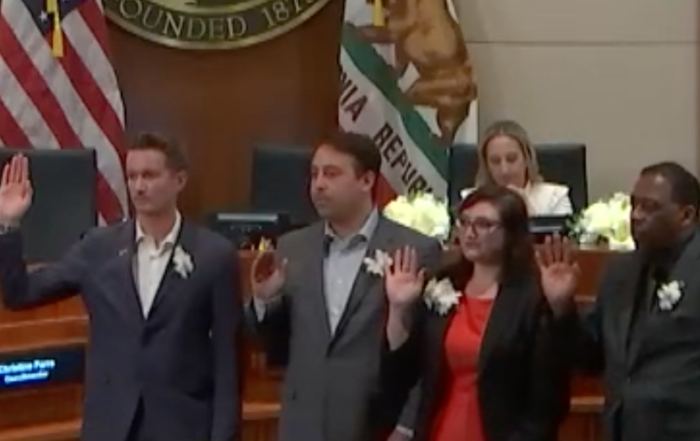On Monday evening, the Culver City Council passed its 2023-2024 budget and Annual Appropriations Limit, also known as the “Gann Limit,” to be $138,125,740. According to City Chief Financial Officer (CFO) Lisa Soghor, the appropriations in the proposed budget subject to this limit only amount to $113,805,786.
In addition to the city’s general fund budget, council was asked on Monday to also consider approval of budgets for the City Successor Agency, Housing Authority, and Parking Authority. They also must adopt a resolution to approve the salary schedule for miscellaneous employees and police and fire safety employees.
Budget adjustments had been made since the council was first presented a proposed budget during a May council meeting. Most notable changes in revenue adjustments since the May proposal included:
- An overall revenue decrease from $328,673,283 down to $318,155,319
- A Transportation Fund cut from $58,872,937 down to $46,673,320
- A Sewer Fund cut from $9,819,000 down to $9,369,000
- A cut to Municipal Fiber from $3,616,314 down to $2,063,885
Soghor explained the Transportation Fund cut was largely an adjustment due to the timing of the replacement of six Culver City buses and the subsequent repayment of grants from CalTrans. Similarly, she said the Municipal Fiber cut was mostly due to an offsetting decrease in expenditures.
Overall, General Fund revenues are projected for 2023-2024 to be $160,452,538.
There were also a number of changes on the expenditure side of the equation. They include, among others:
- An actual increase in Transportation Funding overall from $41,768,582 to $45,648,374, which included a Mobility Improvement increase from $1,100,000 to $2,600,000 and additional funds for equipment maintenance
- An increase in Capital I&A, from $8,623,575 up to $9,373,575
- Spending on Central Stores increased from $2,035,400 up to $2,535,400
- An increase spent on Refuse Collection from $20,700,043 to $22,594,781
Overall, General Fund expenditures are projected for 2023-2024 to be $163,106,681, for a structural deficit of -$2,654,123.
Several city departments also received modest increases to bridge gaps in hiring, enhance training opportunities or consulting services, pay other outside agencies, seek outside grant opportunities, and to expand the Sustainable Business Certification Program. But bar far the largest budget item remains the Culver City Police Department, which has received continuous increases year over year.
An ending General Fund Balance is expected to be $119,133,173. This leaves unrestricted reserves of $76,875,173. At 43 percent of operating budget expenses for 2023-2024, that reserve surpasses the city’s requirement of 30 percent reserve.
Citing that he and others pointed out a transportation discrepancy in the budget during May’s hearing, resident Stephen Jones said over the phone during public comment, “This is a budget process that is hostile to budget disclosure and budget input, right down to the horrific timing of the budget hearings in the middle of the workday.”
Jones also went after a special line item he claims funnels money to a somewhat mysterious fund for police equipment, which he further claims might be for surveillance drones and body cameras. Jones, who has made this point before, claimed that the city has no evidence that the constant annual increases in police department funding are making Culver City residents any safer.
Resident Margaret Peters expressed concern that there isn’t enough funding for parks infrastructure and the kind of funding that will allow for stormwater capture and better-paved alleyways. “Yet, we continue to spend so much money on our police,” said Peters. “We keep spending money on police because the media has convinced us that life today is very dangerous.”
Michael Prudent disagreed, calling in to voice support for the police budget. “At the end of the day, the reason things are going well in terms of Culver City – the reason people feel that it’s safe – is that we have one of the fastest responding police [departments] in America.” He added, “Crime gets more sophisticated, and there are people coming in trying to take whatever they can.”
“I truly believe our budget reflects our values, but I’m not quite sure our budget is quite there, especially in regards to community involvement and the police budget,” said Councilmember Freddy Puza. “My goal is to alleviate the police of responsibilities that they’re not necessarily trained for so they can focus on solving crimes.” Puza identified those responsibilities as dealing with the unhoused population and traffic stops, where he claims a lot of police violence occurs.
Puza also expressed concern over how the budget holds itself accountable for outcomes when it comes to helping the homeless population and those suffering mental health crises. He was also critical of the transparency of the budget process, referring to budget hearings as “arguable the most important meetings the council holds… I would love to see the meetings start at 6:00 p.m., rather than 3:00 p.m.”
Puza then proposed three compromise proposals that he seemed to imply if accepted, would earn his support during the budget vote, saying each of these would signal a willingness to create a more equitable budget:
- Create a catalytic converter theft prevention program. He has read about a new insta-etch marking device the LAPD is using that goes beyond a VIN-number-based system
- Follow the State Racial Identity Profiling Advisory Board (RIPA) recommendations to eliminate law enforcement from conducting low-level traffic infraction enforcement, and ensure that all traffic stops only be based on probable cause of a larger infraction
- Implement a Participatory Budget Process that would convene the public and staff much earlier in the budget cycle to begin discussing and making priorities and adjustments to the trajectory of recent budgets
Councilmember Göran Eriksson disagreed, using surveys of public satisfaction with the fire and police departments as proof that the budget reflects the values of a majority of residents. He says he doesn’t like every line item in the proposal, but “This is a balance that has been worked out by council and staff.” Eriksson did express concern, however, with several million in a structural budget deficit.
“We have a lot of status-quo systems that yield a lot of the same outcomes,” said Vice Mayor Yasmine-Imani McMorrin. “We do know affirmatively that everyone’s needs in our community are not currently being met. I am grateful to see increased investment in the Housing and Human Services Department. I’m really grateful to our former colleague Alex Fisch’s leadership that led to the creation of that department.” McMorrin also expressed appreciation for the community advocacy that led to some of the amendments made to the budget ultimately by staff.
She added the fact that the city continues to provide the Police Department with whatever funding they seek “is a choice.” “We could be identifying opportunities to shift away non-essential roles from our police department, and I believe that is a financially prudent path forward.” McMorrin had, like Eriksson, cited concern with the structural deficit, and said it’s just one of the reasons the city can’t afford such a large investment in traditional law enforcement.
For his part, Mayor Albert Vera said he was fine with the budget as presented. Ultimately, Puza’s proposed compromise provisions were not considered or added.
The Budget was passed, 3-2, with McMorrin and Puza opposed. Mayor Vera, along with Councilmembers Eriksson and Dan O’Brien, voted in favor.
Illustration by Alias Ching
Stay informed. Sign up for The Westside Voice Newsletter
By clicking submit, you agree to share your email address with Westside Voice. We do not sell or share your information with anyone.








